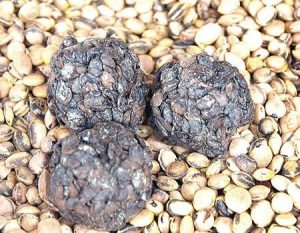It is used for local seasoning of soups, from bitter-leaf soup, okra soup to fried pepper stew for local rice. Indeed, the fermented seeds of Parkia biglobosa or African locust bean tree are used in all parts of Nigeria and the West Coast of Africa for seasoning traditional soups.
Commonly known in Yoruba as iru, or irugba, in Hausa as dawadawa, Nune in Tiv, and in lbo as daddawa, African locust beans when boiled and fermented is rich in lipid (29 per cent), protein (35 per cent), carbohydrate (16 per cent) essential vitamins and minerals such as calcium, fat, potassium, Vitamin C and phosphorus.
Processing locust beans seeds is very crucial as it helps to boost its nutritional value, reduces its natural or synthetic compounds that hinder the absorption of nutrients, boosts its digestibility and enriches its unique flavour in order to boost the smell and taste of food.
Local research has shown that locust bean helps to promote good sight and drives away hypertension and other diseases conditions like stroke and diabetes.
Researchers in Senegal in the journal, Science tried out locust beans on rats to find out whether it actually has any impact on controlling blood pressure and the result obtained showed that adequate doses of locust beans helped to decrease arterial blood pressure.
In the study, diastolic blood pressure measurement enjoyed more reduction than even the systolic blood pressure.
Moreover, in 2005, researchers in the journal, Clinical and Experimental Pharmacology and Physiology, say that blood sugar lowering effect of African locust beans was comparable with glibenclamide, a reference anti-diabetic drug.
Aside its protective effect against some complications of diabetes, the study indicated that it also ameliorates the loss of bodyweight usually associated with diabetes as well as protective against ischaemic heart diseases.
The researchers included Dr Oluyemi Akiloye of the Department of Chemical Pathology, College of Health Sciences Ladoke Akintola University of Technology, Osogbo, in collaboration with Odetola AA, Egunjobi C, Adekunle WA and Ayoola AO.
To benefit from its hypertensive and diabetic effects, an expert in medicinal plants and former Cheif Executive Officer, Nigerian Medicinal Plants Development Company (NMPDC). Hajia Zainab Sharrif’s recommended one to two tablespoonfuls of roasted and crushed locust bean seeds to one teacup of boiled water as an infusion to replace coffee or tea.
The herbal practitioner, who has done extensive work on various plants, said the locust bean tree is so useful to man that, all its parts – leaves, bark, fruit, pulp, and seeds– are essential for human consumption and treatment of different ailments.
According to her, decoction of the bark is used in treating wounds and for burns; its leaves and pods are used to treat diarrhoea and a decoction of the barks is used in treating high blood pressure.
In addition, she added that its green leaves are used in managing intestinal disorders and obesity while its macerated stem bark is taken for ulcers, asthma, and sterility. Mouthwash made from the tree’s bark is used for toothache as it is chewed for virility and for its aphrodisiac effect.
Previously, researchers said that the seed has a better potential for use as a worm expellant agent than the leaf extract. Based on their findings in this study that compared the de-worming effects of the aqueous extracts of the seeds and leaves of the African locust bean (Parkia biglobosa) in cattles, they said that it could be recommended to animals as a safe worm expellant.
What are the other uses of other parts of locust bean tree? According to The Useful Plants of West Tropical Africa by H. M. Burkill, “In Gambia, the leaves and roots are used in preparing a lotion for sore eyes.”
But results of a recent study suggest that the water extract of locust bean tree leaves can be used to boost immunity, especially in immunocompromised individuals. Under laboratory conditions, the water decoction of its leaves enhanced immunity of tested rabbits.
In an analysis on the antibacterial properties of the plant, another study found that “these properties compare favourably with those of streptomycin, making it a potential source of compounds used in the management of bacterial infections.”
Researchers reveal that different parts of locust bean tree are very effective for treating malaria. The leaves, pods, stems and barks can be macerated and used as an herbal remedy for tackling malaria.
Beyond this, in a study conducted by researchers from the Department of Microbiology, Federal University of Technology, Yola, Nigeria, root extracts of locust bean tree offer some protection against urinary tract infection.

